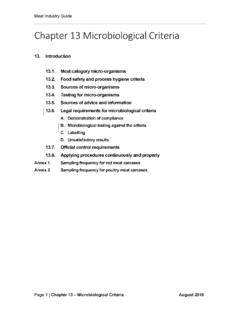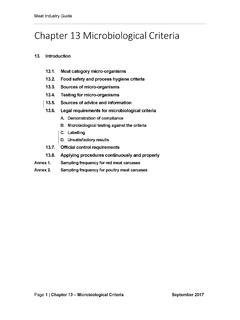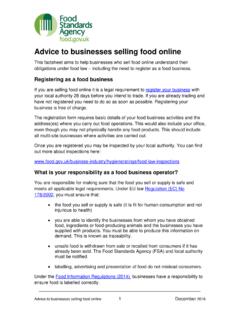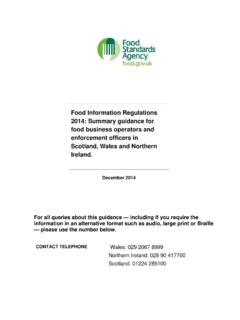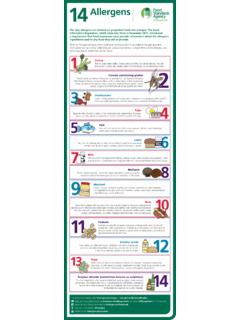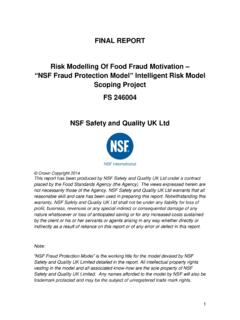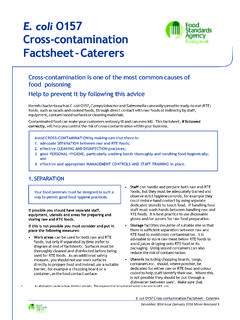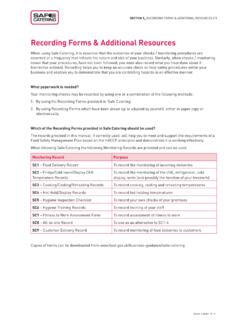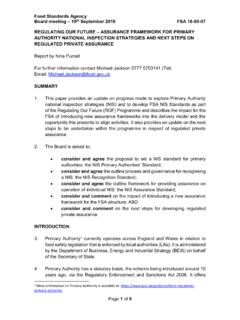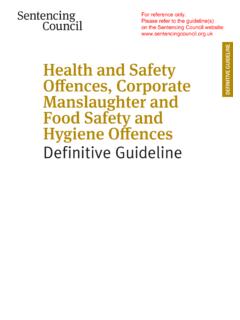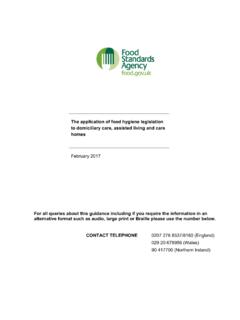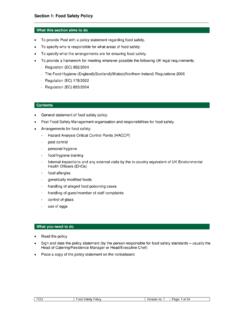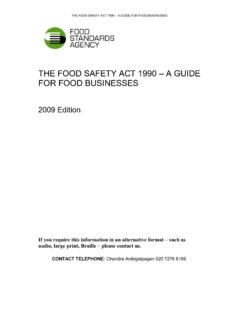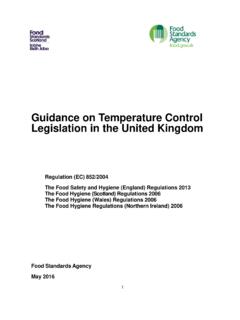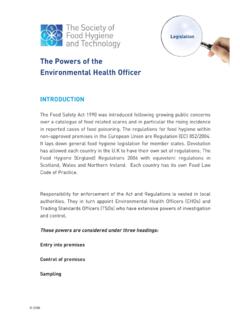Transcription of The Food Safety and Hygiene (England) Regulations 2013 …
1 1 The food Safety and Hygiene ( england ) Regulations 2013 (As Amended) Post Implementation Review 28/02/2020 Foods Standards Agency 2 Contents The food Safety and Hygiene ( england ) Regulations 2013 (As Amended) _____ 1 Post Implementation Review _____ 1 Executive summary _____ 3 Introduction and background _____ 6 Scope _____ 7 Objectives _____ 8 Impact _____ 9 Questions asked and collated responses _____ 9 Consumer perspective _____ 10 Enforcement _____ 11 Comparison of enforcement of the legislation in EU Member States _____ 12 Conclusion _____ 16 Annex I _____ 17 Annex 2. Economic analysis _____ 18 Annex 3. Pre-Consultation Questions, Responses and Comments _____ 24 Annex 4. Pre-Publication Consultees _____ 31 Annex 5. Schedule 7 PIR Consultation Summary of Questions & Responses __ 32 3 Executive summary The UK exited the EU on 31 January 2020.
2 There is now a transition period until the end of 2020 while the UK and EU negotiate additional arrangements. EU law continues to apply in the UK during the transition period, including rules on food and feed. The food Safety and Hygiene ( england ) Regulations 2013 (SI 2013 No. 2996) came into force on 31 December 2013. This routine Post Implementation Review (PIR) is required as part of the Statutory Review requirements of the legislation. In order to do this, the FSA has collated evidence from key stakeholders based on their views and experiences, including on any costs and benefits arising from its implementation. The Regulations revoked and re-enacted, in whole or in part (details indicated), the following Regulations and Orders into a single consolidated Statutory Instrument (SI): Regulation/Order Revoked by food Safety and Hygiene ( england ) Regulations 2013 The General food Regulations 2004 ( 2004/3279) Regulations 3, 4, 5, 6, 6A and 7 The food Hygiene ( england ) Regulations 2006 ( 2006 /14) The Whole Regulations The food Hygiene ( england )(Amendment) Regulations 2010 (SI 2010/534) The Whole Regulations The food Hygiene ( england )(Amendment) Regulations 2012 (SI 2012/1742) The Whole Regulations The food (Cheese) (Emergency Control) Order 1998 (SI 1998/1277) The Whole Order 4 Regulation/Order Revoked by food Safety and Hygiene ( england ) Regulations 2013 The food (Cheese) (Emergency Control) (Amendment) Order 1998 (SI 1998/1284) The Whole Order - The food (Cheese) (Emergency Control) (Amendment) Order 1998 (SI 1673)
3 The Whole Order The Regulations have been amended since coming into force on 31 December 2013. These amendments were (most recent first): Amending Regulation Effect on food Safety & Hygiene ( england Regulations 2013 The Official Feed and food Controls ( england ) (Miscellaneous Amendments) Regulations 2019 (SI 2019 No. 1476) Updating references to relevant EU legislation which has been revoked or replaced by Regulations (EU) 2017/625 of the European Parliament and of the Council on official controls and other official activities performed to ensure the application of food and feed law, rules on animal health and welfare, plant health and plant protection products The food Safety and Hygiene ( england ) (Amendment) Regulations 2016 (SI 2016 No. 868) Provided for the execution and enforcement of Regulations (EU) 2015/1375 on official controls for Trichinella in meat; The food Safety and Hygiene ( england ) (Amendment) Update offences and penalties section; 5 Amending Regulation Effect on food Safety & Hygiene ( england Regulations 2013 Regulations 2014 (SI 2014 No.)))
4 2885) Make continuing provision for the labelling of raw milk intended for direct human consumption with prescribed information relating to the absence of heat treatment. The Official Feed and food Controls ( england ) and the food Safety and Hygiene ( england ) (Amendment) Regulations 2014 (SI 2014 No. 2748) Enforces Regulation (EU) 579/2014 by amending Schedule 1 on definitions of EU legislation; schedule 2 on specified EU provisions; and schedule 3 on bulk transport in sea going vessels of liquid oils or fats and the bulk transport by sea of raw sugar.) Implements Regulation (EU) 218/2014 by revoking regulation 35 and schedule 8 in relation to the special health The requirements introduced by the amending SIs are reviewed as part of this exercise. This PIR reviews the objectives of the consolidation exercise; the extent to which those objectives have been achieved; and, whether they could be achieved by means that impose less regulatory burden.
5 The PIR also considers evidence provided by interested parties on the effectiveness of the Regulations and the extent to which they are still relevant. A light touch review was considered proportionate for this combined PIR due to the low impact identified in the regulatory impact assessments. The FSA view is that the Regulations remain effective and fit for purpose - based on routine engagement and monitoring of UK official controls and enforcement. The level of evidence sourced is commensurate to the scale of the Regulations and associated impacts. 1 Impact Assessment 6 Introduction and background The food Safety and Hygiene ( england ) Regulations 2013, came into force on 31st December 2013, consolidating food Hygiene and food Safety provisions into a single Statutory Instrument. The aims of the consolidation exercise were as follows: To introduce a simplified system of food legislation, in line with the aims of the UK Government s Red Tape Challenge (RTC) initiative2 To rationalise and equalise the penalties and offences for food Safety and for food Hygiene To give effect to the European Commissions package of Regulations for the hygienic production of sprouts and seeds intended for sprouting to safeguard public health To give effect to provisions amending The food Safety (Sampling & Qualifications) Regulations 2013 detailing the qualifications necessary to be a public analyst, food analyst or food examiner.
6 The FSA conducted a formal 6-week public consultation from 02 September 2013 to 14 October 2013, seeking comments on the draft 2013 statutory instrument and the changes in sanctions and powers. (Further consultation was carried out in relation to the amending Regulations ). The consultation was published on the FSA website and stakeholders were emailed with the link to the site. Stakeholders contacted included major industry organisations, organisations representing local authority enforcers and the not-for-profit sector 15 responses were received. Impact assessment3 accompanied the 2 A programme undertaken by the 2010 Coalition Government that offered businesses and the general public the opportunity to challenge the Government on regulation. 3 Impact assessment 7 consultation, asking stakeholders to comment on the FSA s preliminary analysis of the costs and/or benefits of: The consolidation of the national food Safety and food Hygiene law; and The new Hygiene Regulations for seeds and seed for sprouting sector.
7 No significant impacts were identified as a result of the consolidation, including the rationalisation of the offences and penalties. Scope As part of the Government s commitment to review provisions in secondary legislation that regulate businesses, the 2013 Regulations , and each of the three subsequent amending Regulations , require the FSA to undertake statutory review and set out the conclusions in a report within five years of the measure coming into force. A combined, light-touch, review was considered proportionate for these SIs, reflecting the low impact identified in the regulatory impact assessments and the FSA s view on the continued need and effectiveness of the Regulations . The bulk of the 2013 Regulations is concerned with providing enforcement provisions for directly applicable EU legislation.
8 This legislation has been routinely considered and updated by the EU Commission - with input and agreement from the UK whilst an EU Member State (and the then other Member States) and has been given effect in the UK through ambulatory reference. The requirements which the SI enforces are all considered to remain necessary for the protection of public health and consumers interests. 8 The 2013 Regulations also provides Schedules4, some of which contain national law providing requirements for businesses for the following areas: Bulk transport in sea-going vessels of liquid oils or fats and the bulk transport by sea of raw sugar (Schedule 3) Temperature control requirements (Schedule 4) Direct supply by the producer of small quantities of meat from poultry or lagomorphs slaughtered on the farm (Schedule 5) Restrictions on the sale of raw milk intended for direct human consumption (Schedule 6) Derogations relating to low throughput establishments (Schedule 7) It should be noted that the Regulations were recently reviewed in order to fix inoperability s arising from the UK leaving the EU, once the transition period ends.
9 This is outside the scope of the PIR. Objectives The PIR considers whether the objectives of the 2013 Regulations (as amended) have been achieved, and whether they could be achieved by means that impose less regulatory burden. The Review also considers evidence provided by interested parties on the effectiveness of the Regulations and the extent to which they remain relevant. The PIR also reviews the offences and penalties in the 2013 Regulations (as amended) and specifically the inclusion of criminal offences, in line with the FSA s commitment to reduce reliance on criminal sanctions. 4 The Schedules also covered Definitions of EU legislation , Specified EU provisions and Revocations . The Special Health Mark (Schedule 8) was revoked by SI 2014/2078) 9 Stakeholder views, in addition to those provided during the initial exploration with key stakeholders, are now sought via public consultation.
10 Impact No significant impacts were identified by the FSA when undertaking the consolidation and no significant impacts were highlighted by respondents during the formal consultation in 2013, or during the consultations of the amending Regulations . No significant impacts have since been identified during this review of the Regulations , including comments received through our engagement with key stakeholders. It was anticipated that stakeholders should benefit from having all the rules on food Safety and food Hygiene contained in a single SI, instead of having to refer to separate domestic Regulations . This assumption was supported by comments made by respondents to the initial consultation. The Amendment Regulations have reduced the benefits of the 2013 consolidated Safety and Hygiene regulation, but the FSA does not consider it necessary to carry out a further consolidation of these Regulations at the present time.
